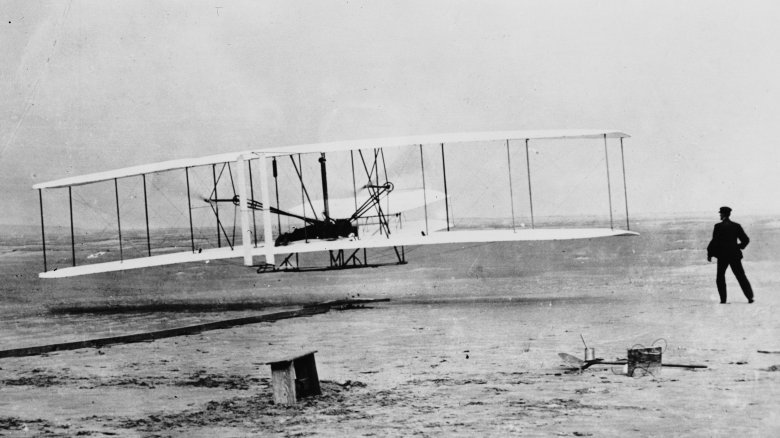Things Scientists Wish They Hadn't Discovered
Scientists probably regret a lot of their inventions, you know, like the Segway and Smell-o-Vision and the Vibrating Ab Belt. But none of those inventions really had a lasting impact on our world and the trajectory of history beyond just providing us with endless fodder for dumb jokes and a constant reminder that no matter how stupid we think humanity is, it's actually even stupider than that.
Some really big, really epic inventions, though, have changed the world in profound ways, and not always for the better. And scientists, being the insightful and intelligent people that they are, are perfectly capable of looking at their inventions and the way they've been used in the world and thinking to themselves, "Ah, crap." The inventors of some of the world's most impactful products and ideas, in fact, have sometimes deeply regretted their part in bringing those inventions into the world. Here are a few of the most prominent examples of scientists who wished they could take it all back.
Orville and Wilbur Wright thought airplanes would be used for peace
At Kitty Hawk in 1903, Orville and Wilbur Wright made four short flights in the world's first powered aircraft. Since then, airplanes have made the world a much smaller place, making it possible for anyone with enough cash and the willingness to sit in a tiny chair for hours with nothing but a bag of honey-roasted peanuts for sustenance to travel halfway around the world in less than a day. But airplanes have a downside, too — a huge downside, and the Wright Brothers came to regret aspects of their epic invention.
According to the Baltimore Sun, the Wright Brothers thought the airplane might allow all nations to gain a tactical advantage in war (mostly through aerial reconnaissance), which would make everyone essentially equal and war therefore impossible. Ha!
"The aeroplane will prevent war by making it too expensive, too slow, too difficult, too long drawn out," Orville Wright said in 1917. And then in 1948 a B-29 dropped atomic bombs on Hiroshima and Nagasaki. In that 1917 interview, Orville Wright had something to say about the possibility of future bombings, too. "We hoped that the possibility of dropping bombs on capital cities would deter [world leaders]," he said. "We dared to hope we had invented something that would bring lasting peace to the earth. But we were wrong. We underestimated man's capacity to hate and to corrupt good means for an evil end."
Einstein regretted his part in the development of the atomic bomb
If the guys who invented the delivery vehicle for the atomic bomb regretted their part in history, just think how the guys who invented the actual bomb must have felt.
Albert Einstein didn't invent the bomb, but his discoveries led to its development. In fact, Einstein's biographer said the idea that nuclear fission might be used as a weapon was first presented to Einstein by Leo Szilard, who explained the explosive chain reaction that would happen in uranium layered with graphite. "I never thought of that," Einstein exclaimed, but the idea was concerning enough that he began to worry that the Germans might be the first to develop a nuclear weapon. According to the Atlantic, Einstein wrote to President Roosevelt and encouraged him to support atomic bomb research. He later regretted writing the letter. "Had I known that the Germans would not succeed in producing an atomic bomb," he said, "I would never have lifted a finger."
Einstein was not the only scientist who felt remorse about the atomic bomb — after the Japanese bombings, physicist J. Robert Oppenheimer was so full of regret that he told President Truman he felt he had blood on his hands. Truman, for his part, did not seem to experience similar remorse — he had Oppenheimer ejected from his office and labeled a "cry baby scientist." How presidential.
Pepper spray was not supposed to be used for crowd control
Pepper spray has done a lot of good, or at least we think it has. Statistics on just how many assaults have been averted by people carrying pepper spray aren't super easy to come by, but there are certainly lots of anecdotal stories about people who scared off an attacker with the stuff, so points for its being helpful in some situations.
Kamran Loghman, on the other hand, is not so sure about pepper spray. And that's funny because he was part of the team that developed it into weapons-grade material for the FBI in the 1980s. According to the New York Times, pepper spray is a "mild, temporary irritant" which has been deemed safe for both those on the giving and receiving end. On the other hand, it sucks to get hit with pepper spray, and Loghman was horrified to see it used for crowd control at the University of California-Davis in 2011. "I have never seen such an inappropriate and improper use of chemical agents," Loghman said. He went on to add that pepper spray should only be used in cases where there's a real, physical threat to the user. So not for controlling peaceful protesters and not for squirting into the face of your roommate for party laughs. Who knew.
The father of lethal injection thinks lethal injection is too humane
Imagine being called "the father of the Segway" or "the father of Smell-o-Vision." That would suck, right? Now imagine being called "the father of lethal injection." At least those first two titles won't cause party conversation to awkwardly cease while everyone within earshot makes excuses and about getting another drink or helping out with the hors d'oeuvres.
"The media sometimes refers to me as the father of the lethal injection," Jay Chapman told the Guardian in 2010. "... It was not one of my purposes in life. It was something I was asked to do and I did it on the spur of the moment."
Chapman says he developed the lethal cocktail because he thought it would make the death penalty process more efficient. He hoped that making execution more humane would lead to swifter executions. But today, he regrets his part in developing the lethal injection system, but not because he's come to realize that capital punishment is barbaric or anything like that. Nope. Chapman regrets developing lethal injection because it didn't really change anything. People still linger on death row for decades. And he says, he actually has the opposite problem with the method — he thinks it's too humane. "I'm an eye for an eye person," he said. "The lethal injection is too easy for some of them."
Mike Tompsett doesn't regret the digital camera, necessarily, but he does regret the selfie
Some inventors regret their inventions not because they caused death and destruction or have the potential to destroy the world or were being improperly used by the authorities. Some inventors regret their inventions because they turned out to be super-annoying.
Yes, we're talking about the digital camera. Now, according to the BBC, Mike Tompsett, who captured the world's first color digital photograph in 1972, doesn't regret the entire concept of the digital camera. Digital cameras have done great things for photographers, not the least of which is making it a lot less expensive and therefore more accessible to the average person. But is it really such an awesome thing that everyone and their duck-lipped teenager has access to a camera with a screen-reversal feature? Tompsett doesn't think so.
"I feel frustrated by all these people who have cameras, taking pictures of everything in sight, and selfies," he told the BBC. "You are walking along and a selfie stick suddenly appears. I sometimes think whoever invented this technology should be dealt with."
There's nothing good on TV
In 1927, American engineer Philo Farnsworth became the first person to successfully transmit a television image. (Prophetically, the first television image was a dollar sign.) According to Biography, Farnsworth patented his ideas and in 1938 founded the Farnsworth Television and Radio Corporation. He had a long and intense rivalry with RCA, which eventually paid him a million dollars for the right to market and sell electronic televisions to consumers.
Farnsworth had big dreams for television — he thought it had nearly unlimited potential as an educational tool, and could solve ignorance and illiteracy. He even believed it could stop war. Thankfully, Farnsworth died in 1971, which was well before Dating Naked and The Osbournes and Pawn Stars, so he clearly missed the worst of it. Still, Farnsworth's son Kent later said that his father hated what his invention had become, to the point where he refused to let his kids watch television. "There's nothing on it worthwhile," the younger Farnsworth remembered him saying, "and we're not going to watch it in this household, and I don't want it in your intellectual diet."
It is worth noting that Farnsworth later had a slight change of heart, when he watched the broadcast of the Moon landing.
Arthur Galston's seemingly harmless research led to environmental disaster
The purpose of something like an atomic bomb or lethal injection is fairly one-note. You can argue about the best and most humane ways to use those things, but it's pretty clear that their ultimate purpose is to kill people. But imagine being a plant biologist and discovering a chemical that might act as a herbicide, and then watching as the military commandeers your research and turns it into a weapon of biological warfare.
According to the New York Times, Arthur W. Galston's research led to the development of Agent Orange, a devastating chemical that was used to destroy crops and reveal Viet Cong hiding places during the Vietnam War. Agent Orange causes plants to shed their leaves, but it's also linked to certain cancers and birth defects. Americans dumped around 20 million gallons of it on Vietnamese land between 1962 and 1970.
Galston was deeply concerned about the misuse of Agent Orange — he was outspoken about the environmental damage it was causing and he even traveled to South Vietnam to see for himself what his research had wrought. He spent his later years teaching and writing about bioethics. "Nothing that you do in science is guaranteed to result in benefits for mankind," he said in 2003. "Any discovery, I believe, is morally neutral and it can be turned either to constructive ends or destructive ends. That's not the fault of science."
Surprise, people used the intelligence test to conclude that some people are stupid beyond help
It's pretty safe to say that intelligence testing sucks. Ultimately, it serves no purpose beyond just giving some people a reason to feel superior to some other people. At best it's obnoxious, and at worst it's just plain evil. But would you believe that the development of the first intelligence test had the best of intentions? It's true!
According to VeryWellMind, the French government commissioned Alfred Binet, a French psychologist, to develop a test that could identify which school kids might need a little extra help with their education. Binet collaborated with Theodore Simon, and together they developed the Binet-Simon Intelligence Scale. But because people suck, the scale was pretty quickly adopted by the eugenics movement, which tried to use it to identify the "feeble-minded," you know, people who shouldn't be allowed to reproduce.
Binet was naturally annoyed that certain psychologists were interpreting the test results as a measure of a fixed biological quality. "Some recent philosophers," Binet complained, "seem to have given their moral approval to these deplorable verdicts that affirm that the intelligence of an individual is a fixed quantity, a quantity that cannot be augmented. We must protest and react against this brutal pessimism; we will try to demonstrate that it is founded on nothing." Sorry, Binet. Most people only like the science that confirms their preexisting beliefs.
The loudspeaker was used for Nazi propaganda
Hooray for the loudspeaker. It's made it possible for humans to shout at each other without raising their voices, and for parties to include the entire neighborhood, whether the entire neighborhood wants to be included or not. Yes, what the loudspeaker has contributed to the history of world obnoxiousness simply cannot be measured.
According to Quali-Fi, the loudspeaker was invented by Peter Laurids Jensen, who was sometimes called "the Danish Edison," though Edison's inventions were nowhere near as obnoxious as Jensen's were. The loudspeaker was first used in 1915 San Francisco to broadcast Christmas carols to a crowd of 75,000. Woodrow Wilson later used it to give a speech to an audience of 50,000 people. But Jensen lived to regret his invention — and not because he realized its potential for annoying entire neighborhoods and making it possible for ice cream trucks to lure dozens of children into the summer streets, but because Hitler used it as a tool for disseminating propaganda during World War II.
Incidentally, Laurids also experimented with developing a wireless phone, so maybe obnoxious inventions were just his thing.
Because of course ecstasy became a party drug
Medicine has a long and not always squeaky-clean history — many medicines once touted as miracle substances have proven to be addictive, dangerous, or downright ineffective. Other medicines that have clear health benefits have been banned or tied up in FDA red tape or were just deemed not profitable enough for mainstream medicine. MDMA in particular has a strange history — if you don't know what that is, you probably have heard it referenced by its more popular name: Ecstasy, the recreational drug that was popularized in the 1990s.
Alexander Shulgin didn't invent ecstasy, but he thought it had psychiatric uses. According to the South China Morning Post, he was first introduced to the drug in 1976 and started developing a way to synthesize it while also developing methods for using it for psychotherapy. Obviously, his plans for MDMA didn't exactly pan out — the drug was banned in 1985 and placed on the list of Schedule I drugs alongside heroine and LSD, drugs with "no currently accepted medical use and a high potential for abuse." Shulgin later regretted that his rediscovery of MDMA had played a part in its rising popularity as a recreational drug.
Yes, people used tracking technology to track people
Sometimes, inventors just have weird ideas about how their inventions might be used. Electronic tracking devices, for example, seem to have pretty obvious applications — you put them on a bad guy so the bad guy can't go do bad things. But that's not exactly what inventors Bob and Kirkland Gable had in mind when they first developed the electronic monitoring system.
According to the Guardian, Bob and Kirkland Gable are twin brothers, both psychology professors with law degrees. They conceived electronic tagging as a system of positive reinforcement rather than the sort of electronic cage it's typically used for today. The idea was to put them on teenage offenders and then reward them for the right behaviors — things like going to school, working, or attending drug rehab. Kids who were tracked in the right places got nice things like sports tickets or free pizza.
The results of the brothers' initial experiments were very positive — the kids who were tracked and rewarded committed fewer crimes, and even when they did commit crimes they were "more creative and less violent," which is ... maybe a plus? Anyway, roughly 15 years after the brothers' experiment, the courts adopted electronic tracking minus the rewards and plus all the punishment. "It's not just idealism," Bob Gable told the Guardian. "It's also scientific fact that rewards and shaping behavior works, and that punishment in the long run is not very beneficial."
Al Neugut regrets making you get a colonoscopy
So you know how when you get to the age of 50 you'll be rewarded for that accomplishment with a colonoscopy? Something to look forward to, right? Hey, what if we told you that colonoscopies are probably totally unnecessary and that the guy who invented them sort of regrets making everyone do them?
Yes, it's true, according to the Healthcare Economist, colonoscopy pioneer Al Neugut designed the procedure to replace the sigmoidoscopy, which looks at only half the colon but has the additional perks of not requiring sedation or having to drink a gallon of laxatives the day before. Also a sigmoidoscopy costs about 25% what a colonoscopy costs and is seven times less risky. It's also pretty similar in terms of effectiveness, although it can't see quite as much of your insides.
"If today, we were where we were in 1988, I would not institute colonoscopy based on the current evidence," Negut wrote in 2010. Thanks, dude.
Alfred Nobel — yes, that Nobel — regretted inventing dynamite
Today the name "Nobel" is synonymous with peace. It is, after all, attached to the prestigious Peace Prize, which has been held by such notable people as Martin Luther King Jr., Linus Pauling, and Barack Obama. So Nobel himself must have been a real granola-eating, tree-hugging, war-protesting peace-monger, right? Nope. Alfred Nobel invented dynamite.
According to Nobel's own home-on-the-web, Alfred Nobel was also involved in the design and development of cannons and rockets. Later in life, he started imagining that he might be able to end war by developing a weapon so terrible no one would dare to use it. "On the day that two army corps can mutually annihilate each other in a second, all civilised nations will surely recoil with horror and disband their troops," he once said. Yeah. Well, we have nuclear weapons now and so far that's worked great.
Nobel appears to have regretted his involvement in weapons-making later in life, or at least that's what Albert Einstein noted in a 1945 speech. "Alfred Nobel invented an explosive more powerful than any then known — an exceedingly effective means of destruction," he said. "To atone for this 'accomplishment' and to relieve his conscience, he instituted his award for the promotion of peace." It isn't clear that Nobel himself ever believed this, but Einstein said it so we'd all like to believe he believed it.













